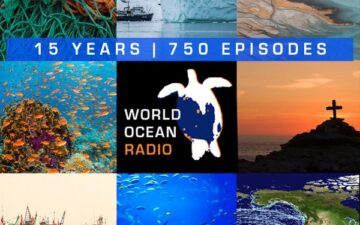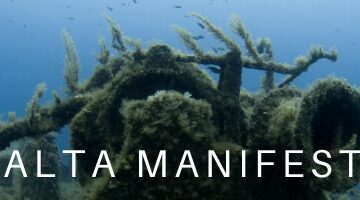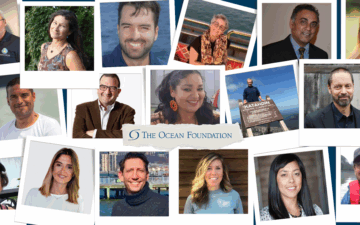Key Takeaways from Our Ocean Conference 2022
Earlier this month, leaders from around the world convened in Palau for the seventh annual Our Ocean Conference (OOC). Originally established in 2014 under the leadership of then U.S. Secretary of State John Kerry, the first OOC took place in Washington, D.C., and resulted in commitments worth $800 million in areas such as sustainable fisheries, marine pollution, and ocean acidification. Since then, every year, island communities have had to grapple between the grandeur of audacious global commitments and the harsh reality of what modest resources actually make it to their islands to support direct, on-the-ground work.
While real progress has been made, The Ocean Foundation (TOF) and our community in The Climate Strong Islands Network (CSIN) were hopeful that leaders would use this historic moment in Palau to seize the opportunity to report out on: (1) how many recent commitments have actually been met, (2) how governments propose to meaningfully act on others that remain in progress, and (3) what new additional commitments will be made to meet the current ocean and climate challenges before us. There is no better place than Palau to be reminded of the lessons that islands have to offer in addressing potential solutions to our climate crisis.
Palau Is A Magical Place
Referred to by TOF as a Large Ocean State (rather than a Small Island Developing State), Palau is an archipelago of over 500 islands, part of the Micronesia region in the western Pacific Ocean. Breathtaking mountains give way to stunning sandy beaches on its east coast. In its north, ancient basalt monoliths known as Badrulchau lie in grassy fields, surrounded by palm trees like ancient wonders of the world greeting the awe-struck visitors who look upon them. Although diverse across cultures, demographics, economies, histories, and representation at the federal level, island communities share many similar challenges in the face of climate change. And these challenges in turn provide important opportunities for learning, advocacy, and action. Strong networks are crucial for building community resilience and staying ahead of disruptive change – whether a global pandemic, natural disaster, or major economic shock.
By working together, coalitions can accelerate the pace of information exchange, strengthen available support to community leaders, more effectively amplify priority needs, and direct necessary resources and funding – all vital to island resiliency. As our partners like to say,
“while islands are on the frontline of the climate crisis, they are also on the frontline of the solution.”
TOF and the CSIN are currently working with Palau to advance climate resilience and protection for the ocean.
How Benefiting Island Communities Benefits Us All
This year, OOC convened members from government, civil society, and industry to focus on six thematic areas: climate change, sustainable fisheries, sustainable blue economies, marine protected areas, marine security, and marine pollution. We commend the incredible work done by The Republic of Palau and its partners in putting on this in-person conference, working through the ever-changing dynamics of the global pandemic we have all wrestled with for the past two years. That’s why TOF is grateful to be an official partner of Palau by:
- Providing financial support to:
- Teams to help set up and coordinate OOC;
- The Chair of the Global Island Partnership (GLISPA), representing the Marshall Islands, to attend in person as a key voice; and
- The closing NGO reception, to build relationships between conference participants.
- Facilitating the development and launch of Palau’s first-ever carbon calculator:
- A further articulation of the Palau Pledge, the calculator was Beta tested for the first time at OOC.
- In-kind staff support for the design and production of an informational video to raise public awareness about the calculator’s availability.
While TOF and CSIN have been proud to provide what we can, we recognize there is much more to be done to adequately assist our island partners.
Through the facilitation of CSIN and The Local2030 Islands Network, we hope to strengthen our support into action. The mission of CSIN is to build an effective coalition of island entities that work across sectors and geographies in the continental U.S. and the nation’s states and territories located in the Caribbean and Pacific – linking island champions, on-the-ground organizations, and local stakeholders to each other to accelerate progress. Local2030 focuses internationally on supporting locally-driven, culturally-informed action on climate sustainability as a crucial pathway for regional, national, and international cooperation. Together, CSIN and The Local2030 Islands Network will work to advocate for effective island-aware policies at the federal and international level and help guide local project implementation by supporting key partners like The Republic of Palau.
TOF’s International Ocean Acidification Initiative (IOAI) program was well represented by its partners. Two of TOF’s kit recipients were present, including Alexandra Guzman, kit recipient in Panama, who was selected out of more than 140 applicants as a youth delegate. Also in attendance was Evelyn Ikelau Otto, kit recipient from Palau. TOF helped plan one of the 14 official side events of the Our Ocean Conference focused on ocean acidification research and capacity development in the Pacific Islands. One of the efforts highlighted at this side event was TOF’s ongoing work in the Pacific Islands to build sustained capacity to address ocean acidification, including through the creation of the new Pacific Islands OA Centre in Suva, Fiji.
Key Outcomes of OOC 2022
At the close of this year’s OOC on April 14, more than 400 commitments were made, worth $16.35 billion in investment across OOC’s six key issue areas.
SIX COMMITMENTS WERE MADE BY TOF AT OOC 2022
1. $3M to Local Island Communities
2. $350K for Ocean Acidification Monitoring for the Gulf of Guinea (BIOTTA) Program
3. $800K for Ocean Acidification Monitoring and Long Term Resilience in the Pacific Islands.
4. $1.5M to Address Systemic Inequity In Ocean Science Capacity
5. $8M for Blue Resilience
The Bottom Line
The climate crisis is already devastating island communities around the world. Extreme weather events, rising seas, economic disruptions, and health threats created or exacerbated by human-driven climate change are disproportionately affecting these communities. And many policies and programs routinely fail to meet their needs. With the ecological, social, and economic systems upon which island populations depend under increasing stress, prevailing attitudes, and approaches that disadvantage islands must change.
Island communities, often isolated by geography, have had less of a voice in U.S. national policy directives and have expressed a strong desire to participate more directly in funding and policy-making activities that affect our collective future. This year’s OOC was a key moment to bring decision-makers together to better understand local realities for island communities. At TOF, we believe that to seek a more equitable, sustainable, and resilient society, conservation organizations and community foundations must do everything in our power to listen, support, and learn from the many lessons our island communities have to offer the world.







